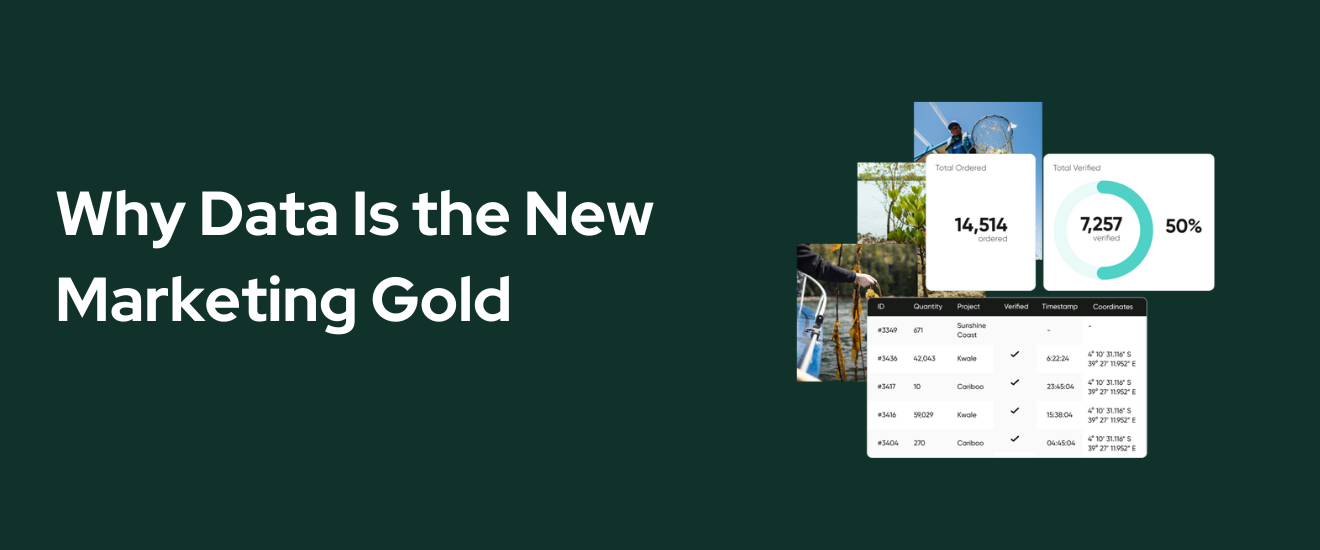Why Data Is the New Marketing Gold
Looking at the importance of project evidence and how we give you and your customers confidence in the impact you're creating
Data has become one of the most valuable tools in a marketer’s toolkit — especially for sustainability-focused brands.
It helps build trust, clarify impact, and turn vague mission statements into measurable results.
In a market where customers are more skeptical of green claims, companies that use verified data can stand out and grow faster.
Today’s Customers Expect Proof
Sustainability has become a consumer expectation.
According to a 2023 study by McKinsey, over 70% of Gen Z and Millennial consumers expect brands to back up their environmental claims with evidence.
The same report found that trust is one of the most important factors influencing whether someone supports a purpose-driven brand.
In other words, marketing built on claims alone no longer works. Modern consumers want data that proves action.
Whether it’s tracking emissions, mapping tree planting efforts, or verifying plastic recovery numbers, data gives your brand a layer of credibility that words alone cannot.
Turning Environmental Data Into Brand Value
Brands that report their environmental impact transparently often see better engagement and loyalty.
For example, when Allbirds started printing the carbon footprint of each product on their labels, it set a new industry standard.
Customers responded positively because it gave them the tools to make informed choices.
Similarly, Ecodrive allows businesses to track and showcase data around reforestation, plastic removal, and kelp restoration.
Brands using the platform can display live impact counters, build personalized customer dashboards, and generate content from verified project stats.
These tools help translate backend data into front-facing stories that support conversions and repeat business.
Using Data to Shape Campaigns and Product Development
When you consistently collect impact data, you begin to see patterns that inform marketing campaigns and product strategy.
For example, a company might notice that tree planting resonates more with customers in urban areas, while ocean cleanup drives stronger engagement in coastal regions.
This insight can be used to create location-specific campaigns or allow customers to choose their impact.
Product development also benefits. A fashion brand tracking the environmental cost of each garment might use that data to redesign high-impact items with lower-impact materials.
Over time, brands that actively use data to improve sustainability tend to earn more customer trust and face fewer regulatory or reputational risks.
Using Verified Metrics as a Growth Lever
The power of verified impact goes beyond messaging. It helps brands form partnerships, secure press coverage, and build stronger relationships with retailers or investors.
Platforms like Ecodrive offer third-party verification, project photography, and ongoing updates — which can be used in investor decks, social campaigns, and annual reports.
Verified data also feeds into SEO and content strategy.
Writing blog posts that share real milestones (like “What It Took to Reach 100,000 Trees Planted”) can attract search traffic and help potential customers see your brand’s legitimacy.
Over time, your data becomes a magnet for both consumers and collaborators.
--
Ecodrive technology was built to deliver and highlight verified data.
We know how important it is for brands to feel confident in the evidence they are showing to consumers.
Learn more by booking a demo below.












